Angkasa, Malaysia delegates visit NACF, Korea to business collaboration.
Trip report by Mr. Wonsick Ju, NACF Representative at Malaysia Business Office
12 delegates from Angkasa (Malaysia Cooperatives Movement) visited NACF (National Agriculture Cooperatives Federation) Korea’s livestock business unit from May 23 to 27.The purpose of the visit was to explore two-way collaboration in the areas of:
- Animal feed import from Korea
- Angkasa staff training in NACF
- Dairy cattle semen and milk export to Angkasa and
- Halal certification support to NACF
The visiting delegates had a meeting with the CEO & President and Vice President of livestock business unit and also with general managers. They visited a farmer, two dairy cooperatives, a Moguchon meat processing factory, a Nonghyup animal feed and theme park (the delegates could not visit the cattle research center because of NACF’s disease protection policy; instead, they heard from a specialist from the center).
NACF the world’s largest cooperative federation has three business units - finance, agribusiness and livestock. NACF has built up the whole livestock supply chain on its own. Below is the structure of the livestock business unit.
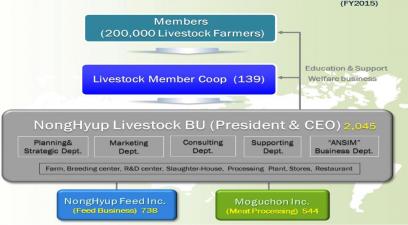
NACF plays a very important role in the livestock business market and is ranked as no.1 in many areas.

Deep discussion between NACF management and Angkasa delegates
On day 1 and 2, NACF held presentation to help the delegates understand its business. Mr. Nam, Vice President of the livestock business unit anda prominent specialist in dairy industry, delivered a lecture on NACF’s livestock business. It provoked a spirited discussion among the participants.
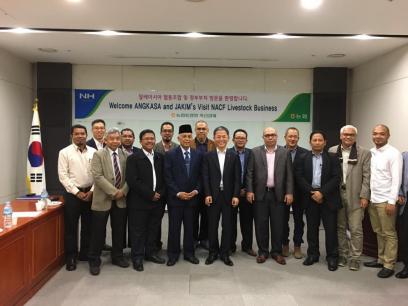
Before meeting with the CEO and President on Day 2, they delegates held business discussions with the livestock management to identify common areas of interest and explore potential business opportunities in the areas of animal feed resource trade, Korean dairy cow semen export, Angkasa staff’s training and Halal certification. NACF imports about 132 thousand tons of PKE (Palm Kernel Expeller) worth 17 million USD from Malaysia and Indonesia. The Malaysian delegates said they have a huge production of PKE that they can export to NACF. If the purchase can be done between NACF and Angkasa, it will be the biggest amount of C2C business in the region (this is being actively discussed with Angkasa).
Angkasa delegates also explored the possibility of NACF exporting dairy cow semen and providing training to their staff on the techniques. NACF has the experience exporting to Uganda and Vietnam and in giving advice to boost productivity of milk. The NACF specialist in dairy breeding assured the delegates of support from NACF.
One of Angkasa delegates from Jakim, the world leading Halal body, was interested in NACF’s recent efforts in Halal certification and welcomed any request related to Halal; the market for which is the fastest growing and becoming a blue ocean for exporters.
With the sincere and lively discussion on Day 1, six representatives from Angkasa had a meeting with the CEO & President of Livestock Business Unit. They exchanged their ideas and agreed to make efforts to expedite the ideas coming out their discussions. The meeting was reported in seven Korean nation wide media outlets. Below is one of them.
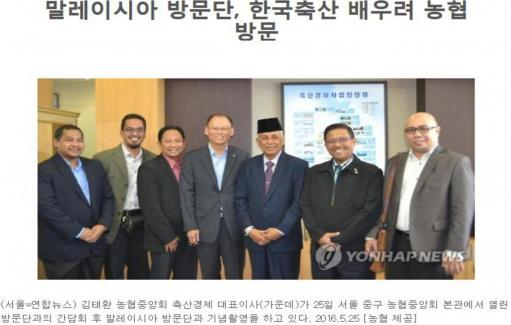
<A Korean media reporting Angkasa meeting with NACF livestock CEO & President>
Experiencing the livestock supply chain
On Day 3 and 4, the delegates visited NACF’s distribution center; Seoul milk, Korea’s largest dairy cooperative;a farmer; and Moguchon meat processing factory. The visit to Nonghyup Hanaro mart Yangjae branch was an eye opener for the delegates. Opened in 1992, the mart is the biggest distribution center of agricultural products, providing variety of NACF branded products that are of good quality, fresh and reasonably priced. The mart net sale per year is almost 100 million USD.it was the first to introduce tracking barcode system for beef products in Korea. The delegates were keen to learn the knowhow and the experience of Hanaro mart. The general manager delivered a session introducing Hanaro mart management and explained the efforts Hanaro mart is making to use local products and local producers.
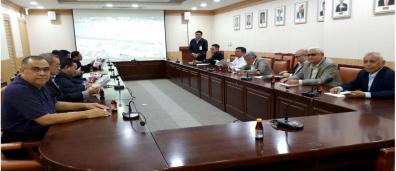
NACF member, Seoul Milk Cooperative (established in 1925), is the biggest milk provider and holds 35% market share. It has many records to its credit; to name a few - the first to adopt Cold Chain System in 1982; the first Jakim, Malaysian Halal, approved dairy cooperative in 2012; and the biggest supplier to military and schools. Many Koreans in their 40’s, can easily remember growing up drinking Seoul Milk.The Malaysian delegates conveyed their deep appreciation of Seoul milk and expressed their desire to learn from the experiences of Seoul Milk. Seoul Milk has 3 factories and would like to get another Halal certification. They asked Jakim’s support which was welcomed by the Jakim representative present.
Later in the day, the delegates visited a member farmer of Seoul Milk cooperative. He and his wife owned 50 cows and got an average 110 litresof milk per cowevery day. The delegates were awestruck as this wasnearly 5 times the average amount in Malaysia. They looked around the facilities at the farm including the hygienic milk squeezing system through which milk is collected twice a day and delivered to Seoul Milk factory.
Good idea with dairy cooperative and Imsil cheese theme park
On the last day, the delegates visited a dairy cooperative, the leading cooperative in the cheese industry and NACF animal feed factory.
Imsil Cheese cooperative was founded in 1982 by a Belgium Catholic priest to help the poor farmers. It has become the largest (and only)cheese cooperative and transformed the region as cheese home town in Korea. The regional government and central government put in funds to build the first cheese theme park in Korea which is visited by 2 million tourists visit every year. Imsil Cheese cooperative advised the delegates there is need to boost domestic cheese consumption in new ways. For example, in the 1990s, Imsil cheese pizza was very popular.
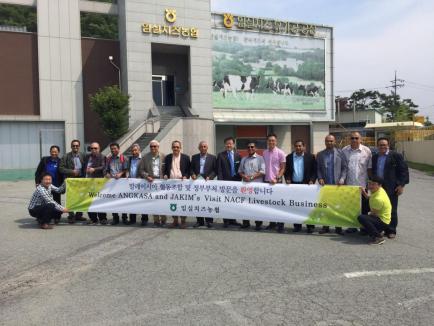
The delegates showed deep interest in the cheese theme park; particularly the ways in which funds were raised to construct the part and its management. The theme park was chosen about 10 years ago by applying the central government project contest. In agriculture industry, the 6th industry a kind of eco-tourism, mixing tour, experiencing, tasting, feeling and buying, is the common interest to raise the income of farmers. Imsil cheese theme park and cooperative are much mentioned in Korea as the good example of 6th industry.
High-end tech of animal feed – Nongyup animal feed
On the last day the delegates visited Noghyup animal feed factory in Kunsan, South West Korea. Nonghyup animal feed is the leader of animal feed market occupying 32% market share in Korea. It plays very important role for farmers by protect them from unfair marketing adopted by private companies and maintain fair price policy.
The Kunsan factory was built in 2012 to meet members demand, keep in sight future trends and accout for the many private companies, including global companies,that had started to produce bio additives. The factory imports many raw resources, PKE (Palm Kernel Expeller), molasses, coconut waste, etc. Some of them are produced as half-finished goods in the Indonesian Nonghyup animal feed factory and shipped to Korea.AS mentioned above, it imports 17 million USD worth of PKE every year. If trade between NACF and Angkasa in PKE comes to fruitiong, both will benefit.
The Kunsan factory policy is not open to visitors to insulate it from virus invasion. The delegates were able to visit the facilities after going through the fumigation process and under strict supervision.
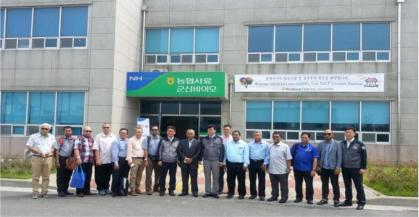
First steps taken with good prospects for success
When I first got the request from Angkasa to organize a visit to NACF livestock supply chain, I was very excited as I felt there was much potential and possibilities to collaborate. However, at the start of the visit, there was no expectation that NACF and Angkasa would find common grounds to collaborate.
NACF through its efforts, having success and failures along the way, has developed and built its own supply chain from breeding center to retailing, like knifeless butcher. It has developed its own cattle cow species and Hanwoo ‘Korean beef’ species. While many Koreans do not commonly eat Hanwoo beef as it is too expensive; recognize that is one of the best beef.
Combining NACF skill and experience with Angkasa resources and strength, a strategic partnership could be developed to benefit both Korea and Malaysia. Both expect the discussions will translate into an agreement that can boost C2C business and yield a good results
This trip would not have been possible but for the efforts of Ms. Noor Azlinn Zahariman in Malaysia; Mr. Beom-seok Lee,Mr. Samseop Lee and Mr. Gwangseog Hong in Korea; and Mr. Balu Iyer in ICA-AP.



